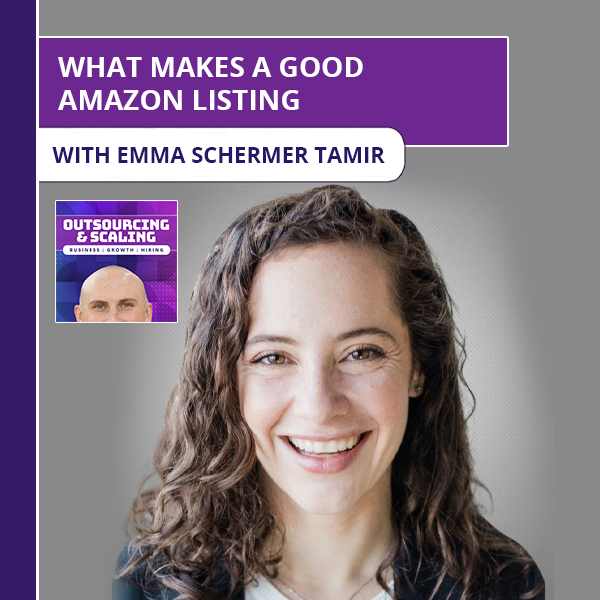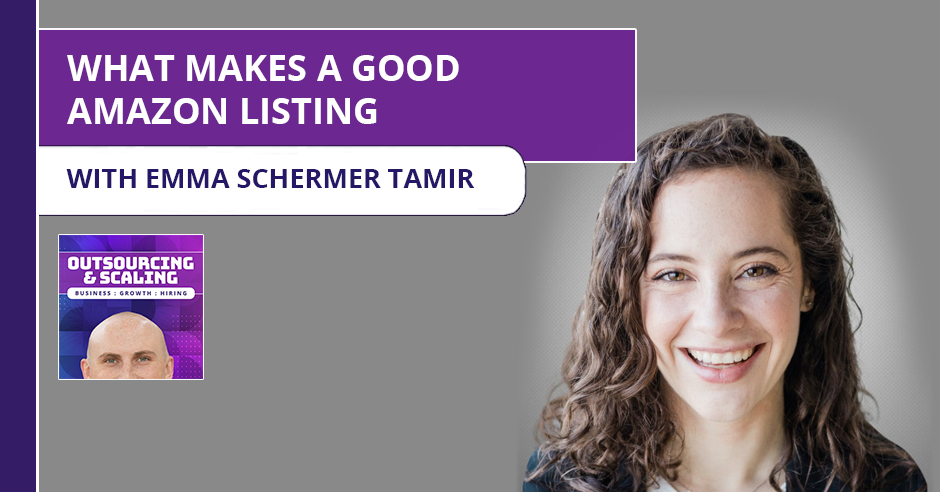


Every online shopper is familiar with the product listing, that is, the product page for each of the items being sold on eCommerce sites. Chances, we all have our favorite sellers or shops we keep going back to. This is probably because of how the sellers or shops list or present their products with titles, images, and prices. Product listing is therefore very crucial in the success of your products. On today’s show, Nathan Hirsch interviews Emma Schermer Tamir about what goes into writing a good marketing copy and turning your website, Amazon listing, or any product listing into an effective sales machine. Emma is the Co-founder of Marketing by Emma and has helped over 650 businesses from around the world boost their sales and build their brands.
—
Listen to the podcast here:
[smart_track_player url=”https://www.podetize.com/statsapi/www.podetize.com/wp-content/uploads/fileuploads/11-5b145ef137b51b3d1af0633e9305c43d/02/2020/76cd24feac935b1f219cffc18ea37fd1.mp3″ title=”What Makes A Good Amazon Listing With Emma Schermer Tamir” artist=”Nathan Hirsch” image=”https://freeup.net/wp-content/uploads/2019/04/OAS.png” ]
Download the audio file here.
What Makes A Good Amazon Listing With Emma Schermer Tamir
My guest is Emma Schermer Tamir. Emma, how are you doing?
I’m great, thanks. How are you, Nathan?
I am doing great. For those of you who don’t know Emma, she transforms her insatiable curiosity into a conversion spiking copy. As Cofounder of Marketing by Emma, she’s helped over 650 businesses from around the world boost their sales and build their brands. Excite your dream clients and turn your websites, Amazon listings and more into effective sales machines with the Emmazon team. We’re going to talk all about that. We’re going to dive into hiring freelancers and talking about Amazon. First, let’s take a gigantic step back. What were you like growing up as a kid? Were you a straight-A student? Were you a rebel? Did you always know that you wanted to be an entrepreneur?
I didn’t see entrepreneurship as something that was in my cards. I’ve always been one of those people where it’s difficult for me to forecast far into the future. I was a pretty outgoing and energetic kid. I was always putting on performances, making people be my audience and dressing my brothers up because I didn’t have sisters. Looking back, I understand that I was always meant to go at and be a business owner because I’m not cut out for the traditional higher lean life. My brain is always thinking about ways to optimize and that doesn’t necessarily fly well when you’re not the one calling the shots.
I’m the same way. It didn’t take me very long to realize that if I wasn’t in charge, I wasn’t going to be very happy in that situation. Did you go to college? Did you have a job after college? Did you dive right into being an entrepreneur? Tell us more about your story.
I went to college. Even in college, I jumped around. I started off at the University of Wisconsin. I went to the University of Missouri. I thought I wanted to study journalism. I ended up getting a degree in political science and Spanish. I’ve always been very curious and allowing that curiosity to lead me. After I graduated, I taught English in Spain. I worked at a farm-to-table restaurant doing marketing. I started gravitating more and more towards marketing. I understood that I had a knack with writing and that was something that my bosses were also starting to identify more and more, even in college, more so as I started my professional career outside of college.
It was when I was living in Israel that I met my husband. On our second date, he was like, “You have to quit your job. I don’t care whether this is something that’s long-term or not with us, but I can tell you’re miserable and that’s not the right fit for you.” That’s when I started to open up my mind to the idea of what it would look like to be a business owner. Marketing by Emma was not our first business idea, but it’s the one that we’ve been running with the longest. It’s been awesome. In case you couldn’t tell what I was talking about, my husband is my business partner. It was more than a second date important suggestion, but the foundations of a professional relationship as well.

What’s it like working with your husband? I know from my side that terrifies me. I would never want to work with my fiancé. It’s not even an option in my mind. I know other people that do it very successfully, but I know other people that have had issues and it’s hurt their relationships. How do you separate the boundaries? How does that work?
I definitely would say that you’re wise to be fearful of it. It’s something that I would not recommend to most relationships. I don’t even know that I would recommend it to myself. At the same time, I can’t imagine doing what I’m doing with anybody else, but it is a huge challenge on a relationship. You need a firm ground of who you are together, what your strengths and weaknesses are. Also, being able to separate out if you’re frustrated with that person in a work capacity, how do you still go home and be able to enjoy life outside of work? When you add into that whole startup world of this intense pressure and thinking about your business 24/7, the boundaries get very blurry. I’m saying what I would love to eventually do, but we’re definitely not successfully achieving perfect balance. More and more, we’re starting to claim weekend time that’s non-work time. It’s a challenge but it’s also awesome. I’m going to China to be speaking and I get to do that with my husband who’s also my business partner. To be able to share all those experiences and to have his support is amazing.
How has Amazon changed since you started? I started in 2008. It’s come a long way. What year did you get into it and what have been the biggest changes that have affected your business?
I got into writing Amazon listings in 2016, definitely not as far back as you. Even in that short period of time, I’ve seen a whole lot change. Amazon has become more sophisticated with how they identify people that aren’t playing by the rules. They become stricter with what you need to do and what you can’t do. Sometimes to the extreme where even if you’re doing what you’re supposed to do because of some lawsuit that’s going on, you still might find yourself in the mix of a problem. That’s something that as Amazon needs to regulate more and more, you have to be aware of what you can and can’t say or what you should avoid saying to keep yourself out of trouble. Even if you can say it, do you want to end up spending months trying to justify why it’s totally okay for you to use that word?
An example that’s been going around for quite some time would be the whole issue with the pesticide lawsuit. There are certain words that fall into this gray zone like “mold” where there are products that are a mold for a hand, for example, that has no reference to the organism of mold. Because Amazon is so vast and needs a way to flag potential bad actors, all those people that are using it the correct way are in this potential danger zone if they are choosing to use a word like that.
What advice do you have for Amazon sellers that are treading on that gray area?
I would say always be overly cautious and ask before doing something because if you put something live and you’re not 100%, you’re going to spend way more time trying to fix something. If it’s fixable, you would if you ask the question on the front end. If there’s anything that’s ever making you question it, it’s always better to ask, whether that’s asking a service professional or even asking Amazon directly.
Give us a little bit behind the scenes of your business. Are you and your husband doing most of the work? Do you have a team or using freelancers? What does that structure look like?
We have a team. We started growing our team about a few years ago. We started off hiring writers because if I wanted to be growing the business and I couldn’t be writing Amazon listings all day. That’s also started to include growing our operations team as well. We’ve tried and failed a few different assistants and now we’ve finally found one that’s awesome. It’s amazing what’s happened in this short period of time. We’ve been working with her for about a month and a half or so. I’m walking my dog and we can automate this thing with Zapier and that would make that so much more efficient. It’s clearing my brain to see all of the ways that we can not only utilize her better but even cut out human interaction when possible now that I’m not struggling to keep up with emails and the day-to-day mess of things.
How is it different managing a team rather than doing it all yourself? How do you keep that quality assurance? How do you communicate? How do you run meetings?
It’s hard. Creative work is very unique and managing creative people is very unique. As creatives, we tend to be quite sensitive. Whether we’re writing for something that’s an expression like an essay or a poem, even if we’re writing something that’s marketing material, we’re still putting our heart into that. One of the things that I was very mindful of when I started to hire writers is that I wanted to cultivate a supportive environment where they could feel safe to be creative, to explore, to make mistakes, to be weird and do all those things that you need to do if you’re going to create a fertile and creative space for people. Otherwise, if they’re fearful of making mistakes, they’re going to close up and you’re not going to get the work that you’re wanting.
I have worked hard to do that. I’ve gotten a lot of positive feedback that our writers do feel very supported to do that. We also are very deliberate with making sure that our quality is top-notch. In addition to writers and them being responsible for editing their own work, we also have editors who review everything. I still give everything the final read over, make any last-minute little edits before ever sending anything out. I’m still looking at everything that goes out. I’m more of the last part in the chain rather than the full chain like on day one.

Let’s talk more about Amazon listings. What makes a good Amazon listing now?
A good Amazon listing needs to do a few things. One is it needs to very clearly communicate what the product is. That might sound a little bit obvious, but it’s amazing how many times you look at something and you’re like, “Is this compatible with what I need?” It’s like a microphone, for example. Will this work with my Apple computer or is it only for PCs? What’s the size of it? How much does it weigh? All of those basic things you need to have because that’s a lot of time what people are basing their decisions on or the finite details. However, those details should be within the context of the benefits of what this product is. Whenever we are making any choices, we’re making them based on emotion. We want to make sure that we are aware of that when we’re creating an Amazon listing and appealing to that in a way that’s going to be relevant to that particular product.
If it is a microphone, what is that person trying to do with this microphone? Is this the top podcasting microphone? If so, maybe that’s somebody that’s a business owner and they’re doing lots of different types of recordings. They want something that they can take on the road with them and that’s going to make them sound professional. Sounding professional isn’t a feature of the product. The feature would be that maybe it has crisp audio, cuts down on outside noise and hones in on the person speaking. The fact that you can present yourself in a professional way so that you can feel super confident about the content that you’re creating, that’s an emotional benefit that’s going to make somebody take notice.
What about outside of Amazon? Marketing and directing traffic to Amazon. Are you guys focusing on doing Amazon listings or do you do swipe copy outside like writing content for Facebook ads, writing content for blogs and directing out external traffic?
We’re mostly focused on copies specifically. Sometimes that can be a website copy, that can be an about page somewhere. We’re less focused on social media blogs. It’s something that’s providing value is different than something that you’re crafting to make somebody take a certain action. That’s what we’re focused on is creating marketing writing that makes people want to do what it is that that brand is wanting them to do. Whether it’s clicking over to Amazon or purchasing or learning more or downloading or whatever that might be.
What about the psychology that goes into writing a good marketing copy? Can you talk a little bit about that?
You want to be clear about who your target customer is. Who is that person and what do they care about? What does their life look like? A common practice that a lot of marketing professionals will do is they’ll create an avatar of their dream client or maybe multiple dream clients. They look at super detailed about what that person wears on Tuesdays or what they eat for breakfast. That might seem overly detailed and unnecessary, but what it does is it helps you to get a clear idea about who this human is and how they’re going to be interacting with your products, the problems that you’re solving. Your product is a problem solver. It’s in some way going to be making your customer’s life better. The clearer that you can be about that and the clearer that you can be about your customer, the more successful you’ll be.
People often are afraid of being specific and marketing to a niche demographic. What they don’t understand is that if you’re trying to everybody, you’re diluting your message and you’re not going to have that same impact. Whereas if you’re clear and focused, not only are you going to strongly appeal to that demographic that might be untapped, but also with time, people outside of that demographic that are interested in that particular product are still going to go to you. If you’re selling something for backpackers, a high-tech backpack that’s super-low weight and dries quickly so your back doesn’t get sweaty. If you’re very clear about marketing to extreme backpackers, you’re going to get the extreme backpackers. With time, you’re going to get the people that are recreational backpackers that want the best backpack. They might not be needing all those technical features but understand that this is the backpack that serious backpackers choose and they want that also.
What else did I miss about Amazon, about your business?
Another important feature when I was talking about Amazon listings that I wanted to mention is it’s important also to have that SEO in mind. You’re not simply expecting that the keywords that your name to use will magically appear in your listing if you’re writing what you need to be writing. To be doing your keyword research ahead of time or hiring somebody to help you do your keyword research and to understand what words you’re needing to incorporate into the body of your text, that’s going to affect how you’re indexing and what you can do as far as your PPC campaigns go. Understanding how to set your product apart so using imagery effectively. If you’re a registered brand, being able to do enhanced brand content and make your brand stand out by being able to incorporate imagery into the body of the listing itself. More than anything else, being very clear about who you’re selling to, that it’s a human. You need to be doing all of these things so that the computers know how to put you in front of the right people. What are you doing to make sure that those people want to buy your product?

Where can people find out more about you? I know you have a special promotion for the audience and what are you most excited about for the rest of the year?
People can find us on Facebook, Marketing by Emma. They can find us on our website, MarketingByEmma.com. It’s probably anywhere else on the internet that you search Marketing by Emma, you would find us as well. As far as the end of the year, what we’re excited about is helping people have an awesome Q4 and starting even to prepare for next year. Q4’s one of those times where you want to make sure that everything’s in line and ready to go. At some point, you want to leave them untouched and you want to let them run. You don’t want to necessarily be doing any crazy changes the night before Thanksgiving that’s putting you in a potentially dangerous point. If you’re doing everything that you should be doing once the holidays hit, you could even begin to start preparing for what the next year looks like and how you’re going to crush that year as well.
I appreciate your time and have a great rest of the week.
Thank you, Nathan.
Important Links:
About Emma Schermer Tamir
 Emma Schermer Tamir transforms her insatiable curiosity into the conversion-spiking copy. As co-founder of Marketing by Emma, she’s helped over 650 businesses from around the world boost their sales and build their brands. Excite your dream clients and turn your websites, Amazon listings, and more into effective sales machines with the Emmazon team.
Emma Schermer Tamir transforms her insatiable curiosity into the conversion-spiking copy. As co-founder of Marketing by Emma, she’s helped over 650 businesses from around the world boost their sales and build their brands. Excite your dream clients and turn your websites, Amazon listings, and more into effective sales machines with the Emmazon team.
